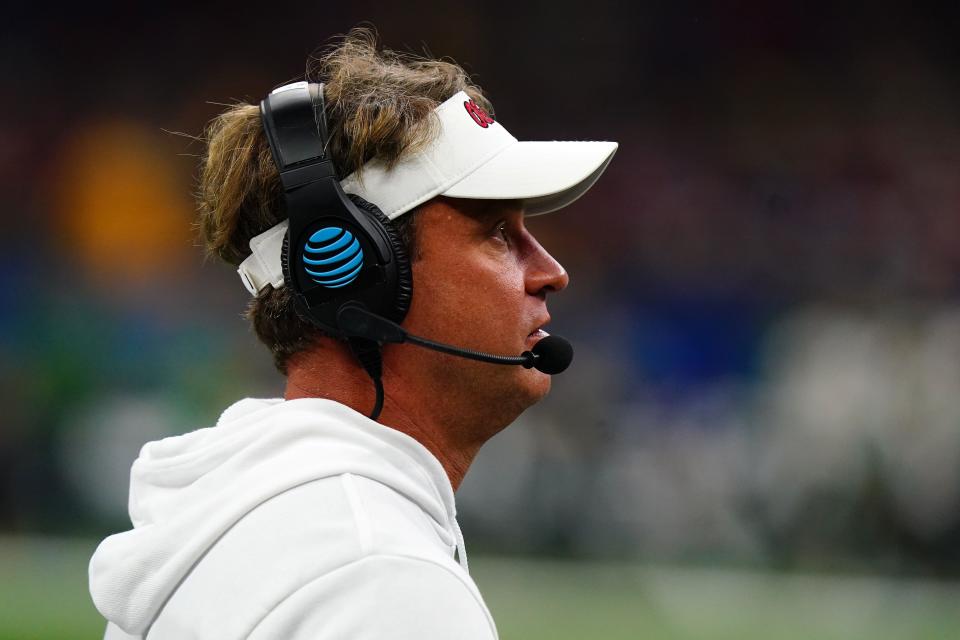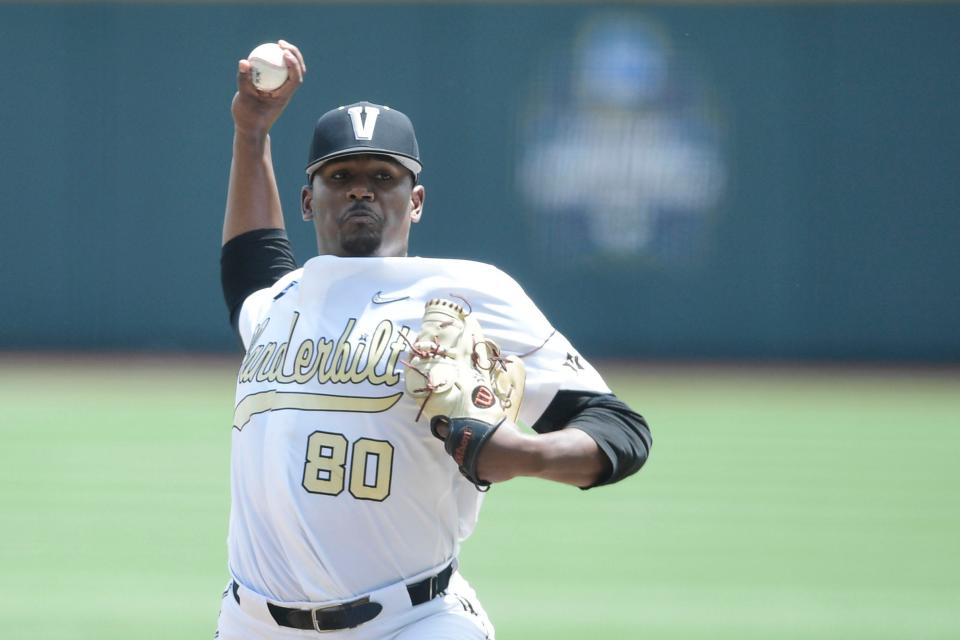When Nick Saban, Lane Kiffin and others are concerned about NIL, we should be, too | Estes
- Oops!Something went wrong.Please try again later.
- Oops!Something went wrong.Please try again later.
- Oops!Something went wrong.Please try again later.
Jimbo Fisher sure is angry for someone with the nation’s best recruiting class.
National Signing Day on Wednesday should have been a celebration at Texas A&M. Instead, it’ll long be remembered as a comical gripe-fest from a coach enraged by perceived slights from other coaches, media and an anonymous message board poster named “Sliced Bread.”
That's our coach. 😤#GigEm pic.twitter.com/xF8HeMHnSV
— Texas A&M Football (@AggieFootball) February 2, 2022
Ole Miss’ Lane Kiffin sounds upset, too. He’s railing against the new era of player “free agency” in college football via the transfer portal. Which is odd, since his Rebels have been doing wonderfully with the transfer portal, adding all kinds of Division I talent.
Then there is Nick Saban. His complaints about the direction that name, image and likeness rights and transfers are taking college football, they might make the least sense. NIL could be a bonanza for Saban’s Alabama players.
"It's not a bad thing that (players) can use their name, image and likeness (to make money)," Saban said. "I think when we start using name, image and likeness to get a player to come to our school, then that's where I kind of draw the line. … It shouldn't be because this school is going to give me this much and that school is going to give me that much.”
Full disclosure: I’m very much in favor of NIL.
I’m also in favor of players being able to transfer without restrictions.
At the same time, I continue to have zero faith in the inept NCAA to be able to manage and mold such complicated issues into a way that is workable for institutions. If I had to guess, I’d say that lack of confidence is shared. That it has more than a little to do with widespread trepidation among college coaches.
I don’t believe coaches are worried about losing specific recruits to, let's say, Texas A&M as much as they are worried about losing the innocence that has separated college sports from the pros.
“What would the NFL look like if there were a couple of teams in the NFL where their salary cap was 10 times more than anybody else's salary cap?” Kiffin said. “That's where you're headed. They're going to have to do something.”

Considering the source, Kiffin's comments are worth our attention. Same for Saban.
As a rule, it's a good idea to pay attention when hearing influential people arguing against their own self-interest.
Who stands to benefit?
Check the football recruiting rankings for 2022: Texas A&M, then Alabama, Georgia, Ohio State, Texas, Penn State, Notre Dame, Oklahoma, Michigan. Same cast of characters. NIL hasn’t changed that. And it won't.
Because who has the support and money to benefit most from NIL opportunities?
When Deion Sanders convinced Travis Hunter, the nation’s No. 1 prospect, to flip from Florida State to Jackson State in December, it mistakenly created a narrative that NIL will even the playing field and bring parity to a sport that needs it.
Wishful thinking. It'll help a lower-profile program coached by Deion Sanders. But for the most part, NIL – as well as the transfer portal – looks more like a way for the rich to get richer in big-time college sports.
You see what Kentucky’s John Calipari said about this? “No one should be able to do it better for men’s basketball than our program,” said Calipari, and he’s 100% right.
A school's reputation is what makes NIL riches a reality.
As a calmer Fisher said appropriately in December during an appearance on Paul Finebaum’s show, “You can't promise things (to recruits). You can't say, 'I'm going to get you an NIL deal.' That's illegal. All you can do is present what other players in your university have done in that past.”
"There's always been NIL stuff going on, it just wasn't legal."
-Jimbo Fisher on recruiting in the new NIL era pic.twitter.com/ZE7qqweUIY— Paul Finebaum (@finebaum) December 15, 2021
Fisher, I think, misled people by going on to offer this juicy thought: “There was a lot of NIL deals going on, Paul, before all this was going on. They just weren't legal.”
You obviously understand what Fisher meant by throwing those stones.
But NIL isn’t about secret deals under the table from a booster. By its nature, in fact, this is the opposite. This is about everyone knowing. It's about profiting off celebrity. It’s about how much an organization is willing to pay an athlete to attach his or her fame to help sell their efforts.
TRANSFER PORTAL FOR ALABAMA: Bryce Young on Alabama football roster movement: 'You see guys' lockers and the names not there'
TRANSFER PORTAL RULES: Lane Kiffin, Ole Miss are happily exploiting 'a major issue' in NCAA transfer portal rules
A matter of fame
Calipari should sing the praises of NIL. He coaches at a basketball-crazy university in a basketball-crazy state. From the moment his players step on campus to the time they exit (often only about eight months or so), they are wildly famous. Kentucky’s program should be a waterfall of NIL riches.
The same holds true for football players in Tuscaloosa and Oxford and most SEC locations where it really does just mean more.
And you know who could have perhaps the largest NIL advantage in any one sport?
Vanderbilt baseball.
After Vandy won the College World Series in 2019, Kumar Rocker was popular enough to land endorsement deals that could have rivaled any of the city’s NFL or NHL stars. Dansby Swanson and other previous Vandy Boys could have, too.
When you mix Nashville’s market size with the Commodores' success and visibility, no other college baseball program offers that much earning potential.

Vanderbilt coach Tim Corbin, like Saban, isn’t against NIL benefits for players.
But Corbin – again, much like Saban – doesn’t sound crazy about the idea, either.
“We deal with it minimally, which is good,” Corbin said last week. “I just don't think these kids should have a lot on their plate at 18, 19, 20 years old. Navigating an academic schedule – certainly here – and navigating growing on the field is probably all they need to do.
“If they build a bank account in a small way, great. But I don't think their mind and efforts need to be moving towards work and finances right now. These should be the best times of their life, and part of that is because they don't have a lot on their plate to eat.”
Elite coaches are saying this sort of thing, and we need to listen to them.
It's tempting to paint it as them being worried about others catching them. That’s not it. The top coaches actually have the most to gain from the massive changes in college sports, and they’re warning us about them anyway.
That shouldn’t be ignored.
Especially by an NCAA that is better at doing nothing than anything else.
Reach Gentry Estes at gestes@tennessean.com and on Twitter @Gentry_Estes.
This article originally appeared on Nashville Tennessean: When Nick Saban, Lane Kiffn are concerned about NIL, we should too

